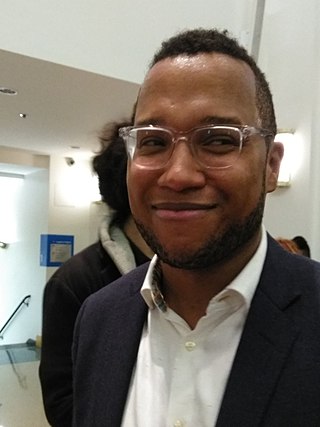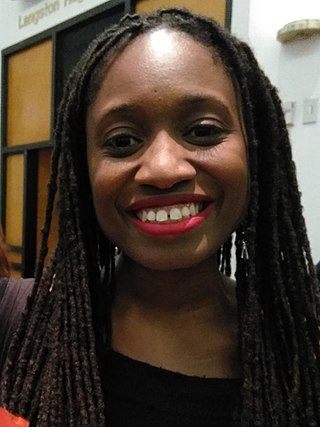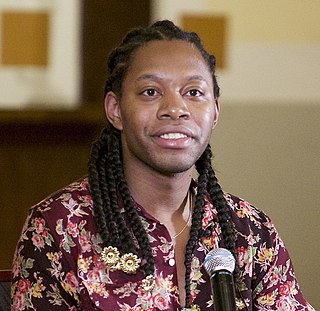Eric Coble is an American playwright and screenwriter. He is a member of the Playwrights' Unit of the Cleveland Play House.
Theresa Rebeck is an American playwright, television writer, and novelist. Her work has appeared on the Broadway and Off-Broadway stage, in film, and on television. Among her awards are the Mystery Writers of America's Edgar Award. In 2012, she received the Athena Film Festival Award for Excellence as a Playwright and Author of Films, Books, and Television. She is a 2009 recipient of the Alex Awards. Her works have influenced American playwrights by bringing a feminist edge in her old works.
Ellen McLaughlin is an American playwright and actress.

Chay Yew is a playwright and stage director who was born in Singapore. He was artistic director of the Victory Gardens Theater in Chicago from 2011 to 2020.

East West Players is an Asian American theatre organization in Los Angeles, founded in 1965. As the nation's first professional Asian American theatre organization, East West Players continues to produce works and educational programs that give voice to the Asian Pacific American experience today.
Eduardo Oscar Machado is a Cuban playwright living in the United States. Notable plays by Machado include Broken Eggs, Havana is Waiting and The Cook. Many of his plays are autobiographical or deal with Cuba in some way. Machado teaches playwriting at New York University. He has served as the artistic director of the INTAR Theatre in New York City since 2004. He is openly gay.

Philip Kan Gotanda is an American playwright and filmmaker and a third generation Japanese American. Much of his work deals with Asian American issues and experiences.
Casey Childs is the Founder of Primary Stages (www.primarystages.org)],[1] a New York State non-profit, Off-Broadway theater company in New York City. Since 1984, they have produced over 175 productions of new plays, many of them world premieres and all of them New York City premieres, by such writers as Sharon Washington, David Ives, Horton Foote, Charlayne Woodard, Melissa Manchester, Jeffrey Sweet, Donald Margulies, Terrence McNally, A.R. Gurney, John Patrick Shanley, Ike Holter, Tina Howe, Charles Busch, John Henry Redwood, Romulus Linney, Lee Blessing, Michael Cristofer, Mac Wellman, Lynne Alvarez, Willie Holtzman, Athol Fugard, Theresa Rebeck, Michael Hollinger and Julia Jordan. He produced the commercial moves of David Ives’ All in the Timing and Mere Mortals and oversaw the commercial moves of Charles Busch's You Should Be So Lucky and Colin Martin's Virgins and Other Myths. He also oversaw the transfer of Horton Foote's Dividing the Estate, which moved to the Booth Theatre on Broadway in association with Lincoln Center Theater. In 2013, in partnership with the New York Yankees, Primary Stages developed Bronx Bombers which played on Broadway at Circle in the Square. Primary Stages was the first theater to produce Conor McPherson work in the United States with St. Nicholas starring Brian Cox. He conceived, commissioned and directed the commercial Off-Broadway show Woman Before a Glass by Lanie Robertson about Peggy Guggenheim with Mercedes Ruehl which ran for seven months at the Promenade Theatre. Other plays he directed for Primary Stages include The Morini Strad by Willie Holtzman, Barefoot Boy With Shoes On by Edwin Sanchez, Bargains by Jack Heifner, Brutality of Fact by Keith Reddin, The Preservation Society by William S. Leavengood, Elsa/Edgar by Bob Kingdom, The Dolphin Position by Percy Granger, Lusting After Pipino's Wife by Sam Henry Kass, The Secret Sits in the Middle by Lisa-Maria Radano, Algerian Romance by Kres Mersky, Madam Zelena Finally Comes Clean by Ron Carlsen, Stopping the Desert by Glen Merzer, In September Woods by David Hill and Nasty Little Secrets by Lanie Robertson. Plays produced by Primary Stages have received many nominations and awards from the Obies, the Drama Desk, the Outer Critics Circle and the Audelco Awards for Excellence in Afro-American Theatre. Plays that began at Primary Stages have received multiple nominations for Tony Awards. In 2008, Primary Stages was honored for its Outstanding Body of Work by the Lucille Lortel Awards. Carnegie-Mellon University awarded Casey their Commitment to Playwrights Award in 1995. From 1982 until 1985, Casey was the Artistic Programs Director for the New Dramatists, America's oldest playwrights’ organization, where he conducted the workshops for over 75 new playwrights in developing over 300 new works. He oversaw the development of new plays by many new playwrights including August Wilson, Wendy Kesselman, John Ford Noonan, Thomas Keneally, Emily Mann, John Pielmeier, Steve Carter, Oyamo, James Yoshimora and Pedro Juan Pietre. Works developed during that time have received productions on and off Broadway and in many American regional theatres garnering Pulitzer Prizes, Tony Awards and other honors.

Rick Shiomi is an internationally recognized, award-winning Japanese Canadian playwright, stage director, artistic director and taiko artist, and a major player in the Asian American/Canadian theatre movement. He is best known for his groundbreaking play Yellow Fever, which earned him the Bay Area Theater Circle Critics Award and “Bernie” Award. Over the last couple decades, Shiomi has also become a notable artistic and stage director. He directed the world premiere of the play Caught by Christopher Chen for which he received the Philadelphia Barrymore Award Nomination for Outstanding Direction. He is currently the Co-Artistic Director of Full Circle Theater Company.
Barbara Schneider originally from Germany, is an American playwright.
Judy GeBauer is an American playwright. Born in Long Beach, CA, she grew up in the Bay Area and spent several years abroad. Her love for acting and writing began early. By third grade, she had written several neighborhood plays and she was appearing in children's theatre productions, playing the Queen of Hearts, a spider, a clown, and a toy soldier. She moved with her family to Denmark during her junior high years and attended an international school and a private girls school in Copenhagen. With her mother and brother she traveled through Europe, the Middle East and Asia before returning to California.
Lila Rose Kaplan is a 21st-century American playwright. She currently lives in Somerville, MA, where she was a Huntington Playwriting Fellow with the Huntington Theatre Company (2012-2014) as well as a Next Voices Playwriting Fellow with New Repertory Theatre (2015-2016).
Tisa Chang is a Chinese-American actress and theatre director born in Chongqing. Her father, Ping-Hsun Chang, was a diplomat, and her family moved from China to New York City when she was a child. Chang was interested in theatre and began studying acting in high school, at the High School of Performing Arts, then at Barnard College. Soon after finishing college, she started her career as an actor performing in Broadway plays and musicals, including Lovely Ladies, Kind Gentlemen and The Basic Training of Pavlo Hummel. She also appeared in a few films, including Ambush Bay and Greetings.

Branden Jacobs-Jenkins is an American playwright. He won the 2014 Obie Award for Best New American Play for his plays Appropriate and An Octoroon. His plays Gloria and Everybody were finalists for the 2016 and 2018 Pulitzer Prize for Drama, respectively. He was named a MacArthur Fellow for 2016.
Harrison David Rivers is an American playwright. Rivers' work has won him the Relentless Award, a GLAAD Media Award, a McKnight Fellowship for Playwrights, a Jerome Foundation Many Voices Fellowship, an Emerging Artist of Color Fellowship, a Van Lier Fellowship and the New York Stage & Film's Founders Award. He is based in Saint Paul, Minnesota and is married to Christopher Bineham.

Jocelyn Bioh is a Ghanaian-American writer, playwright and actor. She graduated from Ohio State University with a BA in English and got her master's degree in Playwriting from Columbia University. Jocelyn's Broadway credits include The Curious Incident of the Dog in the Nighttime. She has performed in regional and off-Broadway productions of An Octoroon, Bootycandy and For Colored Girls. She has written many of her own plays that have been produced in national and collegiate theaters. Some of her more well-known works include Nollywood Dreams and School Girls; Or, the African Mean Girls Play. Bioh is a playwright with Manhattan Theatre Club (MTC) and Atlantic Theater Company, is a resident playwright at Lincoln Center and is a 2017-18 Tow Playwright-in-Residence with MCC. She is a writer on the Hulu show Tiny Beautiful Things.

Aleshea Harris is an American playwright, spoken word artist, author, educator, actor, performer, and screenwriter. Her play Is God Is won the American Playwriting Foundation's Relentless Award in 2016.

Jeremy O. Harris is an American playwright, actor, and philanthropist. Harris gained prominence for his play Slave Play (2018) which received a nomination for the Tony Award for Best Play. Harris is also known for his work in film and television. He produced and co-wrote the A24 film Zola (2021) for which he received a nomination for the Independent Spirit Award for Best Screenplay. He acted in the HBO Max series Gossip Girl (2021), the Netflix series Emily in Paris (2022), and in the film The Sweet East (2023).
Janine Nabers is an American playwright and television writer.
Michael Warren Powell was an American artistic director, director, actor and designer involved in the Off-Off-Broadway movement, Off-Broadway and in the development of new American plays.







